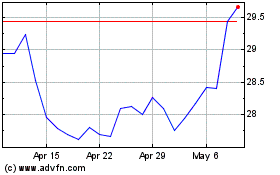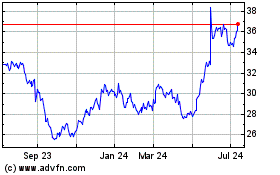Microsoft Unveils New Surface Laptop, Windows 10 S Aimed at Students -- 2nd Update
May 02 2017 - 4:29PM
Dow Jones News
By Jay Greene
Microsoft Corp. on Tuesday unveiled new laptops running a
streamlined version of Windows it hopes will help it unseat
Alphabet Inc.'s Google and Apple Inc. in the classroom.
The most ambitious new product: a sleek, lightweight laptop
Microsoft hopes will compete with Apple's MacBook Air. The new
Surface Laptop, which starts at $999 and comes in four colors, is a
hair lighter and thinner than the Air, and has a slightly longer
battery life at 14.5 hours, according to Microsoft.
Microsoft's partners, including Acer Inc., Lenovo Group Ltd. and
HP Inc., rolled out new laptops for students and teachers starting
at $189. Those devices are aimed at helping Microsoft catch up in
the budget-conscious education market, which Google has seized with
its Chrome operating system designed for low-cost laptops.
All of the new devices run Windows 10 S, a new variant of
Microsoft's flagship operating system. The new OS only permits
users to run apps obtained through Microsoft's online Windows
Store, which the company says makes the devices more secure and
easier to manage. That restriction, though, could frustrate a
customer who, for example, tries to sync an iPhone but can't
because Apple's iTunes isn't in the Windows Store.
The 2.76-lbs. Surface Laptop comes with 4 gigabytes of memory,
while the comparably priced MacBook Air has 8 GB. Microsoft said
that by limiting apps to just those in the Windows Store, it can
improve the speed and battery life on the new devices by keeping
out programs that degrade performance.
If customers want to use apps that aren't available, such as
iTunes or Google's Chrome browser, they can pay $49 to upgrade to
the Windows 10 Pro version of the OS sold to businesses. Other than
limiting apps to those from the Windows Store, there is little
difference between the two, according to the company.
Microsoft announced the new products at an event in New York
focused on education. The move comes as Google has seized control
of a market where Microsoft and Apple once were much stronger.
Customers who use Chromebooks, which cost as little as $150, spend
much of their time in browser-based apps such as Gmail and Google
Docs. The laptops and apps are updated automatically, making them
particularly appealing to schools, which might not have technical
staff to manage devices.
Chrome OS accounted for 58% of mobile-computing devices --
laptops and tablets -- shipped to the U.S.
kindergarten-through-12th-grade market in 2016, according to
Futuresource Consulting Ltd. Windows registered a 22% share, while
Apple held a 19% share.
That market, which hit $10.1 billion globally in 2015, according
to Futuresource, is prize enough. But Microsoft and its rivals are
eager to develop loyalties early, getting students hooked on apps
such as email programs and browsers that they will stick with as
they move to new devices.
What's more, the new devices come after Microsoft revealed its
Surface computers struggled in the most recent quarter. Revenue for
the hardware plummeted 26% in the three months ended March 31 as
Microsoft hadn't refreshed the line in more than a year, and rivals
stepped up competition on prices.
Microsoft is also introducing updates to the education version
of its Office 365 productivity application that will run in Windows
10 S and will be available free to students, faculty and school
staff. The company added Teams, a workplace-collaboration service
introduced in November that competes with Slack Technologies Inc.
The service includes features to let teachers run quizzes and help
students join forces on school projects.
Students and schools also will receive a free one-year
subscription to an education version of Microsoft's popular
Minecraft game to teach coding.
While the $189 starting price for Windows 10 S devices is higher
than the entry-level prices for Chromebooks, Microsoft said the
laptops will support pen-based computing and apps that make use of
augmented reality.
"We think we're entirely competitive in terms of price,"
Microsoft corporate vice president Joe Belfiore said in an
interview.
Microsoft said its Surface Laptop will be available June 15.
Acer said its $299 TravelMate Spin B1 device is available now.
The raft of new products should "stem the bleeding" for
Microsoft in the education market, Forrester Research Inc. analyst
J.P. Gownder said. He believes Microsoft's focus on reducing
device-management costs and headaches will be key to lure some
schools to the devices.
"The cost of Windows was way too high for schools," Mr. Gownder
said.
Write to Jay Greene at Jay.Greene@wsj.com
(END) Dow Jones Newswires
May 02, 2017 16:14 ET (20:14 GMT)
Copyright (c) 2017 Dow Jones & Company, Inc.
HP (NYSE:HPQ)
Historical Stock Chart
From Mar 2024 to Apr 2024

HP (NYSE:HPQ)
Historical Stock Chart
From Apr 2023 to Apr 2024
